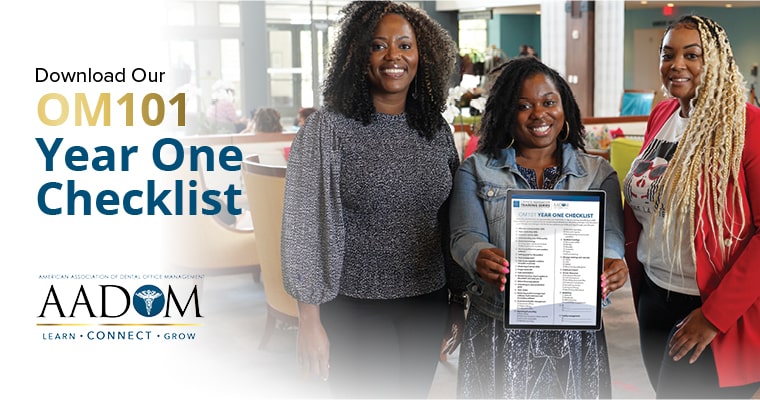Valuing Culture in the Workplace

From the first phone call to your practice to the first step the patient takes through your door, your employees show your clients and patients your office culture.
Your culture is the standards you set. If you allow the bare minimum, that’s all you will receive from your employees. Your one-hundred-percenters will drop down to fifty-percenters because that is what’s accepted. We can all agree that we are experiencing some incredibly intense times. What may have once been considered unacceptable or immoral has gradually been introduced into the workplace as commonplace. This can happen without us even realizing it.
Your workplace culture is rooted in your organization’s character, values, and personality. It is what makes your organization unique. Usually, this is your mission or vision statement. For example, in our practice, “patient first” is our motto, but what does that mean exactly? We put the patients’ needs above all else. However, our doctors also strive to care for their employees, referring offices, and the community.
Establishing Employer to Employee Culture Acceptance
In her article, “How to Establish a Good Workplace Culture in your Dental Practice-Dental Today,” Dr. Ashley Niles stated, “A good workplace starts with you, the dentist. A good workplace culture in your practice can help you retain employees, maintain patients, and attract new clients.”
High-quality culture starts at the top. Hear me clearly when I say this, if all levels of leadership do not commit, it won’t stick.
When developing your standards of care for patients, create one for your employees. What behaviors and attitudes are acceptable to your practice? Where is your threshold, and what will you allow? Communicate this to your team so everyone is on the same page. This will establish accountability and mitigate any favoritism in the workplace.
Workplace trauma with bullying and discrimination can be the downfall of your practice if you do not communicate a clear policy addressing it.
The need for this became apparent when I had an employee remark on another employee’s appearance. The recipient was offended because it questioned her culture. When I counseled the employee on the incident, the employee was oblivious. She did not understand why the other employee was so offended; however, she did not need to understand. All the employee needed to do was abide by our policy. Whether or not you think it is offensive, is not relevant. It matters how the recipient takes it. At this moment, I could not get through to the employee. I looked for training on cultural sensitivity, but yet there was nothing!
Under the Department of Labor and Workforce Development, there are legal restrictions that an employer must not discriminate against an employee based on age, disability, national origin, religion, race, or sex. Each employee has this right, and you also have this obligation. Celebrate your workplace’s culture by providing a diverse workplace with one common goal: acceptance, kindness, compassion, and understanding. Allowing different personalities, religions, and backgrounds to share the same goal.
Instead of having an obstinate mindset, be open to your employees’ views of life. Celebrate the differences that each one brings and support their point of view, even if you may not necessarily agree with it.
Ways We Improve Office Culture
It has been shown that something as simple as having lunch together can improve team performance and help create a more understanding and accepting environment.
We have brought positive culture into our practice through sit-down meals and celebrating milestones such as weddings, baby showers, work anniversaries, and birthdays. We also allow flexible hours and hybrid work environments to balance working from the office and at home for moms. We embrace cultural beliefs such as religion, allowing prayer, quiet moments, and positive quotes to start the morning.
Recognizing Patient Cultures
Culture in the workplace doesn’t stop with your employees; it also involves patients. Louis Sinclair of Colgate Professionals, in his article, “The Role of Culture Awareness in Optimizing the Relationship Between Dental Professionals and Patients,” stated that “As diversity of the United States continues to grow, so too does the importance of providing culturally competent healthcare that meets the individual needs every one of our patients.” This stood out to me because being conscious of patients and their culture is extremely important. Don’t get me wrong, the standard of care will always be one of the most important things, but it is also important to be aware of and respect your patient and their values.
Socioeconomic status is also a cultural item to address for our patients. The “pay at the door, die on the floor” mentality throws your culture out the door. By all means, I know we have to pay our bills and do not want to be taken advantage of; however, there are other options to provide for patients in a socioeconomic crisis. It all comes down to how your practice tolerates, respects, and represents the culture you have set and enforce. By allowing positive workplace culture, we can help eliminate workplace bullying and discrimination while allowing a more open mindset for employees and patients. You would never want to be an employee or patient at a dental office and leave feeling irrelevant and disrespected. If we can all become more aware of different cultures, have an open mindset to changing times, and learn to have more empathy toward situations, we can see an improvement in how we value culture overall.
About the Author

Jenny Brown, MAADOM, received her bachelor of science in public health from East Tennessee State University in 2019. She began working with East Brainerd Oral Surgery in Chattanooga shortly after graduation. Today, Jenny manages two offices and 25 employees. She is the founding president of the Tennessee Valley AADOM Chapter and earned her AADOM Mastership (MAADOM) designation in 2020. Jenny is a member of the ADAA, TDAA, and several other professional organizations. During her free time, she enjoys playing the piano, reading, blogging, traveling, and spending time with her family.








Great article Jenny!